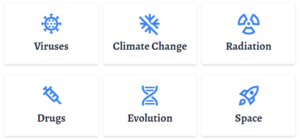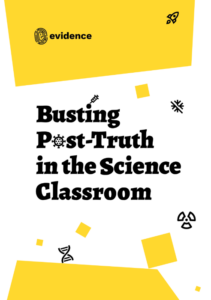
Home
About the project
The frequent incident of pseudo-scientific information, conspiracy theories, and “alternative” facts in media is a new reality. Despite a modern raised level of education and standard of living, the number of people, adopting beliefs that are patently at odds with observable reality and scientific evidence, is a growing concern. Unfortunately, most (science) teachers lack skills to tackle socially sensitive science-related issues in the classroom. Therefore, the main aim of this project was to create a relevant model for implementing EVIDENCE methodology, together with respective teaching-learning materials, that contribute to the development of students’ key competences, such as science, media, digital, and citizenship competence of both GE and VET schools, while addressing socially sensitive science related issues within the context of medicine, healthcare, and the environment more generally.
Objectives
1. To provide GE, VET and HE institutions with an innovative EVIDENCE methodology and respective learning materials for developing key competences through addressing socially acute and controversial science and health related issues.
2. To make science learning more motivating and personally meaningful for diverse groups of students, including those with lack of interest and low academic achievement.
3. To raise involved teachers’, teacher educators’ and students’ awareness about the nature of demagogy, conspiracy theories, and pseudo-science and the nature of science.
4. To raise project teachers’ and teacher educators’ self-efficacy in using EVIVENCE approach and innovative teaching-learning methods, in classroom.
5. To raise school level collaboration between different subject teachers in project schools and between the participating VET, HE, and GE institutions.
Intellectual Output 1
The materials (six modules) try to address the lack of relevant teaching-learning materials able to address socially sensitive science related issues which could help teachers to manage newly raised post-truth challenges in the classroom as well as to develop students’ key competences.

Target groups
Students of general and vocational education schools, 15-18 years old.
Science and social science teachers of general and vocational education schools.
Impact
• Increase students’ intrinsic motivation to learn, raise their key competences including their ability to make responsible health-related decisions;
• the materials/environment are helpful and user-friendly for students and teachers and make teachers feel they are able to implement modules in a confident manner;
• initiate further collaboration between the teachers of different subjects.
Intellectual Output 2
Based on the literature, many (science) teachers lack of skills to tackle socially acute science related issues in classroom. Therefore, a methodological guidebook was developed for teachers to understand how to meet “post-truth” challenges in education, and the nature of the EVIDENCE approach.

Target groups
Teachers of general, vocational, higher, and non-formal education, educational officials, parents.



